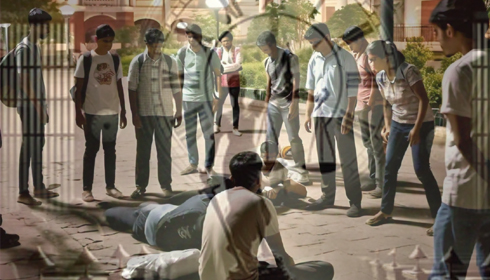
Young Doctor's Death Exposes Dark Underbelly of West Bengal's Medical Education
In a shocking turn of events, a resident doctor at Jhargram Medical College and a former student of RG Kar Medical College, unexpectedly died under mysterious circumstances in a Jhargram guesthouse. The tragic loss has sparked a wave of public outrage regarding the purported “threat culture” present in medical institutions throughout West Bengal.
The incident has brought to light a persistent trend of grievances concerning toxicity, bullying, and the intense pressure experienced by junior doctors in numerous medical colleges throughout the state.
In his guesthouse room, investigators found Dr. Dipro Bhattacharya with a syringe and a note expressing his extreme dissatisfaction with faculty and administrative figures, whom he accused of promoting corrupt practices.
In his note, he expressed strong disapproval of teachers and faculty members who he believes maintain a culture of intimidation and corruption to protect their government positions. He stated, “Shame on all those teachers and faculties who supported threat culture and stood with corruption. You are the reason for the depression, anxiety, worthlessness, and hopelessness of thousands of young doctors.”
His message conveyed a profound sense of frustration and suggested the psychological strain of navigating a workplace filled with power struggles and harassment.
Dr. Bhattacharya’s passing has ignited a wave of reactions on social media, as many users have shared their sorrow and criticized the existing culture in medical colleges. Gopambuj Singh Rathod tweeted, “Dipro was my junior during our MBBS days.” Forever grinning. The news is truly devastating. Some have advocated for a complete transformation, with @drparacetamol0 tweeting, "We should not tolerate toxicity in any department." We should publicly call out and hold accountable every senior, professor, and HOD who exhibits toxic behavior.
Meanwhile, the Calcutta High Court has granted interim relief to seven suspended students of Burdwan Medical College, allowing them to attend classes even as allegations of ragging remain unresolved. Justice Joy Sengupta’s order allows these students to attend classes while restricting their access to the college hostel. The court emphasized that these students have the right to seek police assistance if they face difficulties returning to their classes. Due process led to a contestation of the suspension order, which followed allegations of ragging from fellow students. The students' counsel argued that the suspension was solely based on allegations, without a fair hearing.
The high court's intervention has revealed significant concerns regarding harassment and the absence of procedural transparency within the state's medical institutions.
According to media reports, Kalyan Bandyopadhyay, the advocate for the suspended students, remarked, “This is the threat culture,” highlighting what he described as a trend of punitive measures implemented without proper investigation.
This interim relief follows closely on the heels of a recent order from the Calcutta High Court, which had earlier reversed the suspension of 51 junior doctors at RG Kar Medical College due to similar allegations.
The concept of “threat culture” has become a prominent topic among junior doctors and students, who claim that senior faculty and administration frequently use intimidation to stifle dissent. The tragic rape and murder of a student at RG Kar Medical College has ignited widespread allegations of bullying and harassment, turning the situation into a focal point of controversy. This incident had prompted the Calcutta High Court order a thorough investigation by the Central Bureau of Investigation (CBI), which is now looking into the matter. The CBI has submitted sealed investigation reports to the Supreme Court regarding the incident, making this case a symbol of the challenges facing medical education and administration in West Bengal.
The wider consequences of these incidents highlight a concerning atmosphere within West Bengal's medical colleges, where reports of bullying, harassment, and punitive actions against those who speak out are alarmingly frequent. The ongoing issue of “ragging,” in spite of strict regulations, remains a significant danger to student welfare. Moreover, the structure and power relations within these institutions seem to enable unrestrained harassment by individuals in positions of authority.
Public sentiment on social media showcases a wave of frustration and disillusionment with the system. Users like @MonojitSeal expressed their political frustrations, stating, “Sad, it’s time for revolution." "We cannot allow any more doctors to lose their lives!" Many ipeople channeled their frustration toward political organizations and authorities they hold accountable for these harmful environments.
The tragic losses and reported suicides of young doctors spark critical concerns regarding the safety and mental health of individuals in the field of medical education. As two prominent cases emerge from RG Kar and Jhargram Medical College, state authorities are under increasing pressure to tackle the harmful practices prevalent in medical institutions. Dr. Bhattacharya’s tragic death and the high court’s recent decision to allow suspended students back in class highlight the urgent necessity for reform.